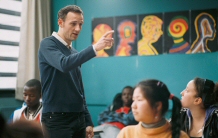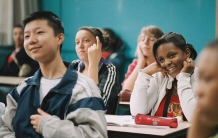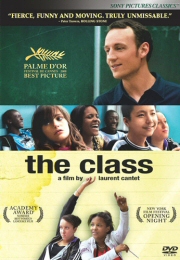- Rated R
- Drama
- 2008
- Buy the DVD
All photos © Sony Pictures Classic
Reviewed by Bob Westal
()
lassroom dramas are a venerable subgenre, populated by troubled students, charismatic and dedicated teachers, lots of entertaining dramatic contrivance, comic relief and heavy-duty sentiment. Often, there is a pop music soundtrack and we are usually treated to a big finish of some sort. “The Class,” which won the Palm D’or at Cannes in 2008 and was France’s entry for the Best Foreign Language Oscar last year, has the troubled students and the hardworking teacher, but its approach is a million miles from any tale of educational triumph and tragedy you’ve ever seen.
Drawn from an autobiographical novel by punk rock singer turned highly successful writer François Bégaudeau, “The Class” is in a subgenre all its own: an educational procedural. Like many a good police procedural, the events are entirely on the job and the film takes a hard-edged, facts-only approach. Directed with a disciplined, unyielding eye-level view by Laurent Cantet (“Time Out”), we learn little of the students’ home life, except by way of rumor, and the only personal detail we learn about the teacher is that he admits to being heterosexual. And, while this in an urban, multi-ethnic school in today’s Paris, we’re a long way from some of the overcrowded human dumping grounds that sometimes pass for American inner-city schools. This is a good, if flawed, educational environment with mostly well intentioned and hardworking teachers and students. We get the impression everyone is both trying to make the best of things and simply get through the day and the school year. The tension is so great that the film often feels like one of those work-related dreams from which you wake up tired.
At the center of everything is author François Bégaudeau as Prof. François Marin. In the past, casting someone to more or less play themselves in this way has not always had the best results, but here it’s seamless. Good teachers are often natural actors anyway, and the writer – a movie critic for French “Playboy” – proves to be a natural who should seriously consider more roles to supplement his writing gigs. Indeed, it’s an understated departure from the usual run of overtly theatrical movie teachers, from Miss Jean Brodie and Prof. Kingsfield to Jaime Escalante and Albus Dumbledore. Marin is far from uncharismatic, but he doesn’t conquer his class with showbiz flair, he engages them in something very much like mental martial arts. It works better than you might think, at least until his lets his emotions and understandable annoyance get the better of him.

The students, who we are told are all 14 or 15 years of age, are equally credible. Cantet’s approach was to use a great deal of improvisation with his inexperienced cast, though he says the final film is nevertheless quite close to the published screenplay co-written by Bégaudeau, Robin Cantilo and Cantet. With all but two of the students using their real first names, the results are impossible to argue with as each of the 25 youngsters comes across as fully developed individuals. Of course, just like in a real classroom, it’s the troublemakers and the neurotic achievers who nevertheless attract the most attention.
In the case of Esmeralda Ouertani, those roles are combined in one character. She can be an ironic suck up when she’s feuding with her friend, Khoumba (Rachel Regulier), who rebels by refusing to read in class. She agrees to read in class “avec tres tres grand plaisir,” and Ouertani’s reading of those words is snarkily delicious. The subtitled translation of “I’d be delighted” really doesn’t do it justice. Later, she rebels herself in even more dramatic fashion.
And that brings us to one of the film’s primary subjects: language. We Americans can fixate on it, but the French are supposed to be obsessed with it. As Prof. Henry Higgins observes in both “Pygmalion” and “My Fair Lady”: “The French don’t care what they do, actually, as long as they pronounce it properly.” Appropriately enough for a film about a teacher of literature and composition, much of “The Class” is taken up with questions of language and how it relates to such issues as social class, especially after Prof. Marin unwisely lets down his guard and says that Esmeralda and a friend had behaved like “skanks” (translated from the French word “pétasse”). Their differing understanding of the word, which Marin seems to believe means something somewhat like “bimbo” and which Esmeralda says means “prostitute,” is a classic case of the kind of communication-based imbroglios that can throw a classroom, or an entire society, into virtual chaos. Here, it sets off a chain reaction with potentially tragic results for the class’s most aggressively difficult student, Souleymane (Franck Keïta), whose father may be ready to send him back to his native Mali if he is expelled.
Even without such potentially weighty outcomes, “The Class” would be an unusually tense experience. A film that is truly about work, it encapsulates a school year’s worth of labor into 130 fraught minutes which feature plenty of humor, but very few truly light or relaxed moments. Director Cantet does almost too good a job of never allowing his audience to forget the constant high wire act of being a good teacher; each day they must undertake any number of roles while constantly keeping their guard up, maintaining discipline while hanging on to their sense of humor and humanity. From what I understand of the profession, “The Class” is very much like a really good day at school – engaging as can be, but also kind of exhausting.
Single-Disc DVD Review:
This DVD includes subtitled audio/video commentaries in which Laurent Cantet and François Bégaudeau look at the creation of a pair of key sequences and their overall approach to putting together “The Class.” There is also an informative 45-minute featurette detailing the highly collaborative process of putting together the film, starting with lengthy workshops in which Bégaudeau and his 25 young costars improvised their way through the story, while somehow finding their way to a film that was pretty much as originally intended. Ironically, while the movie avoids a big, feel-good finish, the video documentary ends with a bang. We see the entire young cast head to the Cannes Film Festival and look on as jury president Sean Penn proclaims them the winner, and Robert De Niro presents their film with the most coveted festival award in world cinema. That’s a pretty big finish.
 |
 |
 |
 |
 |
 |
You can follow us on Twitter and Facebook for content updates. Also, sign up for our email list for weekly updates and check us out on Google+ as well.












